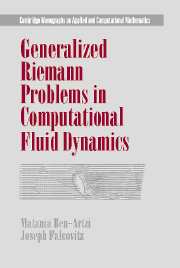Book contents
- Frontmatter
- Contents
- List of Figures
- Preface
- 1 Introduction
- I BASIC THEORY
- 2 Scalar Conservation Laws
- 3 The GRP Method for Scalar Conservation Laws
- 4 Systems of Conservation Laws
- 5 The Generalized Riemann Problem (GRP) for Compressible Fluid Dynamics
- 6 Analytical and Numerical Treatment of Fluid Dynamical Problems
- II NUMERICAL IMPLEMENTATION
- A Entropy Conditions for Scalar Conservation Laws
- B Convergence of the Godunov Scheme
- C Riemann Solver for a γ-Law Gas
- D The MUSCL Scheme
- Bibliography
- Glossary
- Index
6 - Analytical and Numerical Treatment of Fluid Dynamical Problems
Published online by Cambridge University Press: 20 August 2009
- Frontmatter
- Contents
- List of Figures
- Preface
- 1 Introduction
- I BASIC THEORY
- 2 Scalar Conservation Laws
- 3 The GRP Method for Scalar Conservation Laws
- 4 Systems of Conservation Laws
- 5 The Generalized Riemann Problem (GRP) for Compressible Fluid Dynamics
- 6 Analytical and Numerical Treatment of Fluid Dynamical Problems
- II NUMERICAL IMPLEMENTATION
- A Entropy Conditions for Scalar Conservation Laws
- B Convergence of the Godunov Scheme
- C Riemann Solver for a γ-Law Gas
- D The MUSCL Scheme
- Bibliography
- Glossary
- Index
Summary
Here the fluid dynamical theory and GRP schemes of Chapters 4 and 5 are applied to one-dimensional test cases. The problems are aimed primarily at demonstrating the capabilities of the scheme, but they are also revealing of nontrivial fluid dynamical phenomena that arise even at the relatively simple one-dimensional settings considered here. In Section 6.1 we treat a shock tube problem, using several scheme options to solve it. An interesting class of fluid dynamical problems is that of wave interactions, to which Section 6.2 is devoted. We selected four different cases in this class, shock—shock, shock—contact, shock—rarefaction, and rarefaction—contact interactions. In each case the GRP solution is compared to either an exact one or to a solution of a Riemann problem that approximates the exact one in some “asymptotic” sense. In the remainder of the chapter we employ the quasi-one-dimensional (“duct flow”) scheme, solving three different problems, comparing each numerical solution to the corresponding exact one. Section 6.3 treats a spherically converging flow of cold gas, and Section 6.4 is devoted to the flow induced by an expanding sphere. Finally, in Section 6.5 we present a detailed treatment of the steady flow in a converging—diverging nozzle, obtained numerically as a large-time solution by the GRP scheme.
The notation for the fluid dynamical variables here is identical to that of Chapters 4 and 5.
- Type
- Chapter
- Information
- Generalized Riemann Problems in Computational Fluid Dynamics , pp. 184 - 232Publisher: Cambridge University PressPrint publication year: 2003



